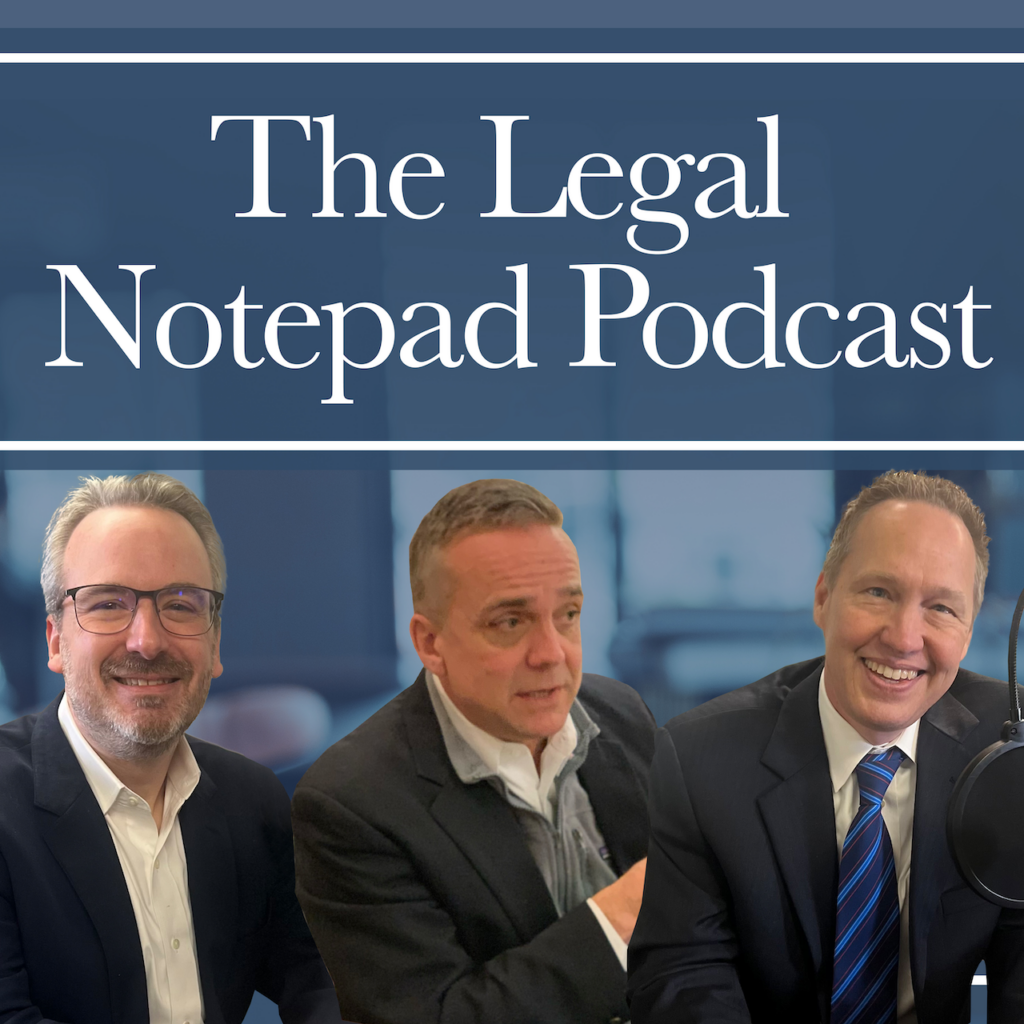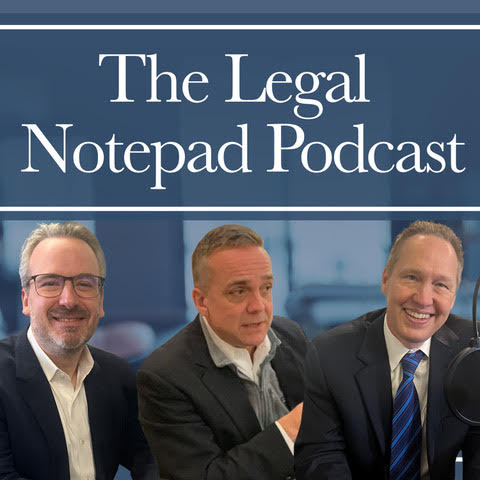Episode 10: Louisville attorneys Rob Mattingly and Kevin C. Burke recorded an episode during a CLE conference in Las Vegas, in front of their colleagues. Several of them stepped up to the microphone to as a few questions. Let’s join Rob and Kevin as they discuss KRS 411.188 – Mandatory Notice of Subrogation Rights.
Editor’s Note: If you are an attorney and would like CLE credit for this episode, visit the Kentucky Justice Association website, click the Education and Training tab and look for the podcast.
TODAY’S LEGAL QUESTION:
Opposing counsel claims medical expenses must be excluded because we didn’t file our KRS 411.188 notice. How should we handle that?
Understanding KRS 411.188
Kevin begins by reviewing the statute. The notice provision is addressed in Sections 2 and 4:
2) At the commencement of an action seeking to recover damages, it shall be the duty of the plaintiff or his attorney to notify, by certified mail, those parties believed by him to hold subrogation rights to any award received by the plaintiff as a result of the action. The notification shall state that a failure to assert subrogation rights by intervention, pursuant to Kentucky Civil Rule 24, will result in a loss of those rights with respect to any final award received by the plaintiff as a result of the action.
4) A certified list of the parties notified pursuant to subsection (2) of this section shall also be filed with the clerk of the court at the commencement of the action.
Kevin explain that the legislature passed a comprehensive set of bills related to civil actions, in 1988. The statute was part of HB551 (a tort reform bill), refer to Section 4. O’Bryan vs. Hedgespeth was discussed in Episode 7 of the podcast focusing on the Collateral Source Rule. Several sections have since been ruled unconstitutional.
Rob and Kevin note that Section 2 provides that the plaintiff shall give notice to parties which are subrogation holders (i.e. health insurance companies, workers’ comp carrier, STD or LTD carrier, etc.). Section 4 requires that the plaintiff also file notice with the court that the notice was given.
How to Comply with KRS 411.188
Rob explains there are basically 2 ways to do this. In his notification letter to subrogation holders, he includes the following: “I have read KRS 411.188 and that statute says I must tell you that you must intervene. If you don’t intervene, you lose your subrogation rights.” This ensures Rob has complied with the Section 2 requirement. Rob, then, files a Notice to Subrogation Holders pleading, in circuit court, with the following language: “Please be advised that as of [insert date], I have sent notice of the duty to intervene to the following subrogation holders: [insert list].” This ensures Rob has complied with the Section 4 requirement.
After filing the pleading, Rob attaches a copy of the pleading to the letter he sends to the subrogation holders, via certified mail. This process takes minimal time and is worth the effort.
Rob and Kevin comment on how defense attorneys are beginning to use violations of KRS 411.188 more frequently.
Kevin has seen other firms comply using a slightly different process. You could include a Certificate of Compliance with KRS 411.188, within the complaint. This would include a list of the subrogation holders you are notifying. This would then be filed without the need for a separate document.
Providing Notice to the Subrogation Carriers
Who are you actually required to notify? Rob and Kevin discuss the PIP carriers for automobile accident cases. Kevin points out the Motor Vehicle Reparations Act (MVRA) is a comprehensive statute. PIP, or no-fault coverage, is a separate part of the MVRA and is not covered by KRS 411.188. Not notifying the no-fault carrier doesn’t mean you have failed to comply.
Rob mentions Ohio Casualty Insurance Company vs. Ruschell, states the “notice provision does not apply to my PIP carrier.” Kevin explains how the MVRA abolished, with conditions, the tort liability for anything covered by PIP. Again, you do not have to send notice to the PIP carrier.
When Added Reparations Benefit Coverage Has Been Purchased
Kevin explains that in situations wherein added PIP coverage has been purchased, there is a State Farm case that says Added Reparations Benefits (ARBs) are considered to be the same as PIP.
Do I Need to Give Notice to the Workers’ Comp Carrier?
Kevin says this is the exact opposite analysis. Kentucky workers’ comp benefits are paid pursuant to KRS Chapter 342. It contains a specific subrogation section (KRS 342.700). Subsection 1 specifically says you must notify the workers’ comp carrier pursuant to KRS 411.188.
Question from Attorney Mark Smith
Conference attendee, attorney Mark Smith asks a question about when a case involves both workers’ comp and an auto accident (“a hybrid case”). In Kentucky, workers’ comp takes priority over PIP. In a hybrid situation, do we still have to give notice to the comp carrier?
Rob confirms that yes, notice is still required to be given to the workers’ comp carrier. Kevin reminds us that there’s no penalty for over-compliance. You could even include the no-fault carrier, if you decided to do so.
Mark Smith has been practicing for 33 years from Louisville office. He mainly handles personal injury cases. Mark enjoys handling automobile accident cases. He’s presented at this annual CLE conference on numerous occasions. This year’s presentation involved using the Kentucky bad faith statute to maximize the recovery for his clients. Mark’s phone number is (502) 641-9848.
Notifying Health Insurance Companies and Federal ERISA Plans
This is the most common situation. Rob sends notice to the health insurance companies every time, regardless of whether a PIP carrier was involved.
However, the case law has evolved. If the carrier decides not to intervene, they lose their subrogation rights, according to the statute. The question is how can Kentucky law preempt a federal ERISA statute?
Kevin and Rob use a couple of cases to explain the situation. In Humana Health Plan vs. Powell, the 411.188 doesn’t apply to ERISA plans, because it was part of a statutory tort reform plan. The Kentucky state law doesn’t preempt federal ERISA law.
Therefore, Rob and Kevin recommend sending notice to every health insurance plan. What’s the downside? Why lose sleep over it? Send the notice and know that you’ve complied.
KRS 411.188 can’t be used as a sword against an ERISA plan. However, it can be used as a shield protecting you against an insurance company making the claim that you violated the statute.
Question from Attorney Andrew Mize
Conference attendee, attorney Andrew Mize poses a question. Assume you’ve given notice, proceed through the litigation, but still receive no response from the subrogation holder. How long does that party have to come after you, especially in federal court under ERISA?
Rob responds there are generally 2 types of health insurance plans, ERISA plans and non-ERISA plans. He goes back to the Humana v. Powell case wherein 411.188 cannot preempt an ERISA plan. Therefore, the subrogation rights would be based on the underlying contract of the policy. The ERISA plans have a right to recover from the funds you receive as part of a settlement/verdict. Assuming the contract doesn’t have a statute of limitation, it would default to Kentucky contract claim, which is now 10, although Kevin points out it could be 15 (depending upon when the contract was entered).
If a non-ERISA plan is involved, KRS 411.188 applies and notice must be given to the health insurance carriers. Rob would file a motion, in circuit court, to extinguish the carrier’s lien. He would then send a copy to the carrier. Non-ERISA healthcare plans are bound by the statute. If they don’t intervene, a judge may decide to strike them.
Andrew Mize is an attorney with Stranch, Jennings & Garvey, PLLC in Nashville. He handles complex personal injury cases, especially those involving minors. He also focuses on plaintiff-side class actions and consumer rights litigation. The firm handles claim on a nationwide basis. He has built a niche in cyber-security and data breach actions. His office phone number is (615) 254-8801.
Question from Attorney Mark Smith
Mark asks a second question. When a client visits a doctor’s office and signs a lien contract, does this create a subrogation claim that would require attorneys to provide notice under KRS 411.188?
Rob and Kevin admit they haven’t actually thought about this issue. This raises the question of whether the provide has to intervene or whether you would even want them to intervene? Could you take their deposition for free? There’s actually a lot to this.
Mark comments that this can become an issue when the client doesn’t have PIP coverage. The doctor wouldn’t get paid until the bodily injury claim gets paid by the tortfeasor. The doctor would definitely have a lien on the settlement/verdict.
Rob, thinking out loud, assumes the doctor hasn’t paid out anything, so it wouldn’t necessarily be a subrogation claim; it’s a lien. Therefore, KRS 411.188 probably does not apply.
Kevin comments that you could include them in the notice list. If the lien contract has subrogation language, it might match up with KRS 411.188. If they don’t intervene, you may be able to strike them.
How Do Plaintiffs Use It and How Does the Defense Use It if You Don’t Comply?
As already touch on previously, if you comply and the entity decides not to intervene, you would file a motion to strike their subrogation interest.
However, this statute can also be used against you. If you fail to provide notice, you are barred from using your medical bills. Is this really why the statute was written? Kevin admits Sections 2 and 4 protect the interest of the subrogation holders. It’s not specifically geared toward the tort defendant.
At the time this statute was written, Subsection 3 (O’Bryan) had not be ruled unconstitutional. Now, if the defense is using 2 and/or 4 to eliminate the medical bills, doesn’t really follow what the statute was originally intended to do.
Question from Attorney Peter Jannace
Conference attendee Peter Jannace asks a question of Rob and Kevin. Given that some sections were ruled unconstitutional (namely Section 3), have the pertinent, remaining sections been evaluated by a court as to their constitutionality?
Kevin explains there is no appellate opinion based on a challenge to Sections 2 and 4. However, as a practical matter, why wouldn’t the arguments made in O’Bryan vs. Hedgespeth apply to Sections 2 and 4?
If you find yourself in a bind, you should consider including a challenge to the constitutionality. Be sure to properly preserve it for appeal. There’s no reason not to do it.
Peter Jannace is an attorney with Herzfeld, Suetholz, Gastel, Leniski and Wall, PLLC. Peter practices out of the Louisville office. He focuses on employment law and labor law. He also has experience with complex and class action litigation. His office phone number is (502) 636-4333.
If You’ve Received Notice
Kevin lays out a process. First, identify whether you were required to give notice. Make the arguments included in O’Bryan vs. Hedgespeth and notify the state attorney general.
You need to contact the attorney general because your argument is going to include a question of the unconstitutionality of the statute. If you fail to do so, the court of appeals will consider it an unpreserved issue.
That’s a wrap on today’s discussion. We hope you found the discussion insightful. As always, we encourage you to share this episode with your colleagues.
If you’d like the case notes, please sent us an email request and we’ll be happy to email you the file including the cases, rules, etc.
You can follow our podcast on a variety of platforms including, Spotify, iHeartRadio, Amazon Music, Audible, Apple Podcasts and many more. Thanks for taking the time to listen.
For more information about the Law Offices of DeCamillis and Mattingly, PLLC
Address: 138 S. Third Street, Louisville, KY 40202 (across from The Old Spaghetti Factory)
Phone: (502) 589-2822
Website: DeCamillisMattingly.com
To Contact Kevin Burke:
Website: BurkeNeal.com
Phone: (502) 709-9975
The Kentucky Bar Association Requires Us to State “This is an advertisement.”




